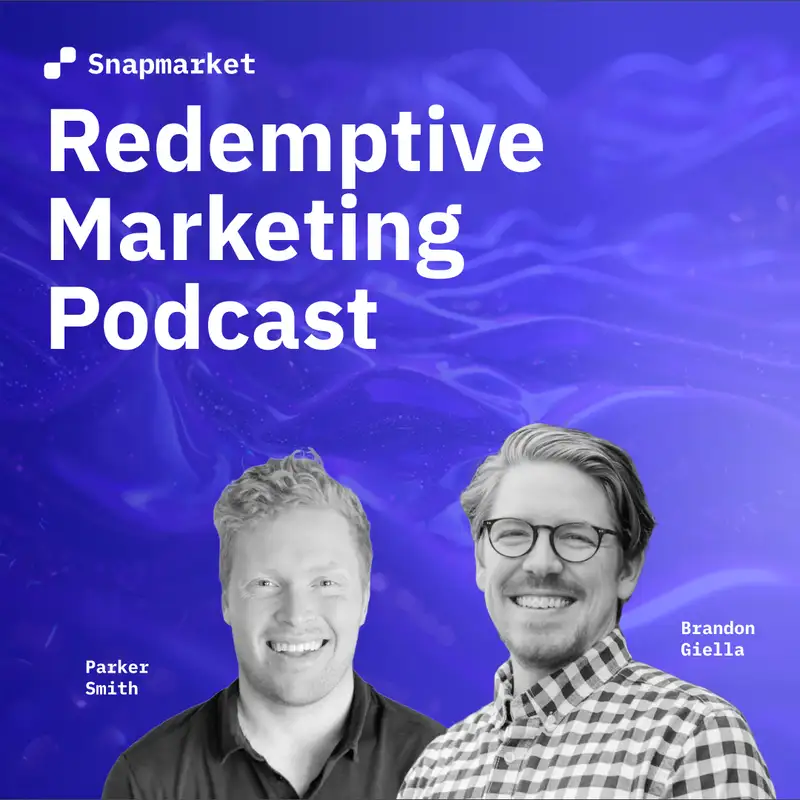019: The work of local culture
Snap market.
Brandon Giella: Hello, Parker.
We're back.
Parker Smith: We sure are.
We're, we're as back as ever.
Brandon Giella: This is, uh, this is
several months after episode 18, which
is, we finished up sometime in the
fall and then we got really busy and we
were like, whatever, we'll just, we'll
just get back to our podcast next time.
Uh, so here we are
January 6th, a lovely day.
And we're back at talking
on this microphone.
Parker Smith: Yeah, and you know what?
I, I have a, I have a poem for you.
It's, uh, it's poem number 20 of 2012 by
Quendelberry, the, the tried and true.
And it says, sit and be quiet.
In a while, the red berries, now in
shadow, will be picked out by the sun.
Brandon Giella: Is that, is that
Parker Smith: That's it.
Brandon Giella: Oh, okay.
That's great.
You know, I'm glad, I'm glad you,
you brought up Wendell Berry.
That's a lovely poem.
And to sit and be quiet.
That seems like an apt topic.
Oh
Parker Smith: our, you know,
we had our first week off
since starting the business.
Brandon Giella: my gosh.
Parker Smith: Christmas.
Um,
Brandon Giella: It was legitimately
the first time in two years I felt
like I could just stop my brain.
Parker Smith: yeah, and even
that was like, you know, stopping
your body and then your brain had
like this inertia of two years.
I'm sure, you know, for me to,
so rest and Sabbath and, and,
uh, that, that's something that
we're coming out of and hopefully
going into some more of this year,
Brandon Giella: Amen.
Amen.
I've been thinking during that time
of rest, it made me realize like
how human so much of our work is.
And I know that's such a buzzword,
like it's so human, you know, whatever.
But, um, but truly like how limited
we are as creatures and also how
organic, uh, so much of our life is.
So I think like.
You and I being tech enthusiasts and in
our modern American life and building
a business and all the productivity
talk and, you know, just that whole
zeitgeist, if you want to call it,
there's so much about like systematizing
efficiency, industrialization,
you know, all this kind of stuff.
And we get wrapped up in that.
But I read a book of
essays by Wendell Berry.
It's over my shoulder here.
Uh, it's called the world ending fire.
And he talked so much differently
than that against that kind
of industrialization and
efficiency and, and all of that.
So if you don't know Wendell Berry, he
is a writer and a farmer in Kentucky.
Parker Smith: 18th century.
Right.
Oh, in a 21st century body, right?
Brandon Giella: Yes, very much.
Yes.
Yeah.
I think he's still alive in northern
Kentucky, but he wrote an essay.
It's a little book, uh, and
then, uh, uh, called why I am
not going to buy a computer.
It's very interesting.
And then he also has a team
of horses is how he farms.
So he doesn't use tractors,
that sort of thing.
So you can get an idea of who this guy is.
Anyway, he's got this.
A whole bunch of essays that talk about
this idea, but there's one in particular
called the work of local culture and
it starts with this image of a bucket
that's been sitting on a fence post for
decades gathering, you know, bugs and,
you know, squirrel droppings and acorns
and leaves and all kinds of stuff.
And in that decay, topsoil growing.
And he talks about how a culture of
a community is the same way that it's
all these like stories and memories and
people and All of this that gets decayed
into a local community that builds over
time and that's what creates culture And
if you are the type that industrializes
everything and systematizes everything and
gets down to maximum efficiency You lose
that topsoil Or that culture that actually
makes humanity flourish that makes it run.
It's what it is.
It's what humanity is So i've been
thinking a lot about this with
ai In that we use ai every day in
almost every process that we use.
I love it.
We love It's very helpful to produce
things But I get this sense that we
lose that kind of like topsoil culture
that is so important for marketing,
for writing, for just who we are,
what a brand is, what a business is.
And my goal is to get back to that kind
of organic, human, imperfection, almost
like that local culture, topsoil idea,
running a business, being who we are
with all of our Humanity, I love theology
and I love writing and I am impatient
and I am, so many different things about
me and I want to bring all of that for
all of us more to bear on our work.
But I also want to bring
that to our clients.
And in addition to that,
there's this verse that's been
in my head, Matthew 12, 36.
Where Jesus is talking
about bearing good fruit.
So there's some more farming
metaphors and stuff in there.
And, but he, but he says, um, this
is the new living translation, but
he says, and I tell you this, you
must give an account on judgment
day for every idol word you speak.
And I'm thinking about that verse
because AI produces a lot of words
and I've been wrestling with like,
Parker Smith: Many of which are idle.
Brandon Giella: say what?
Parker Smith: Many of which
the words are idle, you
Brandon Giella: Yes, yes, yes, yes.
Parker Smith: cut that
that doesn't make sense.
That's like
Brandon Giella: Yeah, it's
superfluous, you know, it's,
it's like too many words really.
And there's so much in the Bible
about too many words that the, the
wise, you know, shut their mouths.
James talks a lot about, you know,
bridling your tongue in a sense.
So I just, these two ideas
are like kind of wrestling.
I'm wrestling with these things
like our, you know, commitment to
efficiency and, and productivity
and production and all of that.
But also like.
Organic human content.
And then especially like AI, because
I've gotten this sense that like,
when I see something as AI produced,
I kind of tune out and I quit reading.
So how do we use AI effectively to produce
content, but at the same time, make it
so rich and good quality that people
don't tune out, you know, and that it's,
that's also authentic to the brand.
Parker Smith: what are
the, what are the signs?
How do you know Just by reading
something that something's ai
Brandon Giella: Yeah, a couple of things.
When I see the word delve, no, not
many people use the word delve.
I know AI does though.
I also see the construction of
it's not just blank semi colon.
It's also this, or it's more
this, or it's that like that, that
kind of, uh, you start with the
negative and then it's always a
semi colon and then it's a positive.
That construction is very much AI.
There's also like, uh, capitalization.
People are very inconsistent capitalizers,
uh, cause there's different styles.
There's like, you can do all first letter
caps in a, in a headline, or you can
do the AP style capitalization, or you
can do Chicago style capitalization.
And I've noticed that most of the time.
AI is a mix of AP and Chicago,
which is kind of funny.
Um, and then I see bullet points and
then there's just like a couple of these
like tells, or if it's doesn't really
have a strong voice, it's just sort
of a bunch of adjectives put together.
So I just, um, Yeah.
I don't know.
I got some tells and I can just kind of
read it and sense like, I don't think
this was written by a person and I just
care less and, and especially if I see
hashtags at the bottom, because, because
when you, when you ask AI to create a
social media post, it always adds hashtags
and people throw those into LinkedIn.
And I just, I don't know.
I just tune out.
Parker Smith: and emojis for people who
are like, you would never use an emoji
Brandon Giella: Yeah.
The star emoji says it's
exciting news star emoji, you
Parker Smith: Yeah.
Brandon Giella: So I just see three.
Let's see this thing.
Parker Smith: So, yeah, bringing up
Wendell Berry as, as the intro to this is
interest is, is fascinating because I can
almost hear him sharpening his pitchfork.
Um, just, we didn't even have to
have AI as part of this conversation.
It's like digital marketing, like.
You know, I'm sure he has some opinions
on, um, on digital marketing in general.
So like, um, you know, when you're talking
about, uh, you're wanting to, to kind
of preserve this element of humanity,
like, what are you talking about?
Like we're, Oh, we're starting
a newspaper, like a print.
Brandon Giella: Yes.
I would love to start
a really cool magazine.
But it's a terrible business.
But I just love the idea of an indie mag.
Parker Smith: Yeah.
so really what are like
when, you're thinking of,
we need to be accountable
for the words we speak.
We, as marketers, are
speaking on behalf of others,
not just speaking anything, but our
goal is to speak, for our, philosophy.
Ideally, something that's redemptive,
something that is, leading to the
flourishing of all stakeholders involved.
and, Or at the very least
ethical, along those lines.
and wondering how we, can
engage, that way with, how we've,
approached AI to this point.
And, a helpful, phrase that we've carried
with us, is the term human robot human.
so all our efficiencies we're
hoping, help us engage well with our
clients so that when we get input
from them, we can be unhurried.
We get what we need and then we work
blazing fast and then we With the help of
ai and then we we curate it we craft it.
for stretch for then a human communication
on the back end where we can spend
time Revising and that sort of thing.
So tell me what you think about that
Brandon Giella: Yeah.
For the record, we, everything
that we produce, we have an editing
layer or quality check layer.
And then of course we send it to
the client for them to edit it.
So there's like multiple steps where,
you know, human is looking at that.
So we always have had that human robot
human, cause you don't, you don't ever
want to just create something with AI
and just like send it, you know, you
want to make sure it is saying accurate
things and we have improvements to
make there, you know, cause sometimes
we could learn some of the client.
some of their like brand or offerings
or whatever a little bit better
and, and do a better job with that.
But, but I think that the thing that
comes to mind immediately is that
there is no substitute for quality
writing, like for a human being to
sit down because writing is thinking.
as you write something out,
you're actually thinking about it.
You're putting words to it.
You're giving it structure.
And because when it's in your mind,
you don't actually know it that
well until you can write it out and
explain it especially succinctly.
So I'm committing more to, to write more
for the company, like just literally
sitting down and writing like a newsletter
every week, and things like that.
And I would advise clients and anybody
doing any kind of marketing there,
there literally is no substitute for
you, especially if you're an owner.
Or an executive to sit down and write.
There just isn't a substitute.
However, not everybody is a good writer.
Not everybody likes to write.
Not everybody has time to write,
but you do need marketing.
You need good content.
So it's that balance of like, how do
you create this base layer of content
that keeps the lights on, keeps people
engaged, helps your sales team, that
sort of thing, but also has that very
organic, very personal feel to it.
And I think it's a challenge.
So I think the first thing that we
could do is improve our client style
guides in our app, such that when
the AI content is processed through
that filter on the other side of it,
it's already like very, high quality.
But then, and then we come in with
a human touch on the other side.
Um, but I, but I just think
there's no, there's no.
Substitute for, for, you know, folks
sending us or, or publishing themselves
high quality, good writing, you know,
and, and I think every business leader
should devote some time to that in
their week to run any things out.
Parker Smith: yeah um And that helps
both clients and your team align on,
as a leader of your company, what
your thoughts are and what direction
you believe things are going.
Um, not everybody considers
themselves a writer.
And so the thought of writing
regularly may feel intimidating.
Which is a reason that we, um,
devote so much attention to
our voice to market process.
So the idea is, Somebody who may not
have time to write, um, or may not
have time to market as a subject matter
expert could speak because, uh, at the
very least, people can speak, um, their
expertise, speak their thoughts, um,
and that, that's a way for that human
element to then handshake with robot.
Where we can deliver the marketing
content, um, for effective communication.
Cause at the end of the day, organic
marketing is marketing, you know,
it's driving sales and stuff,
but really, really at the core of
it, it's communicating what your
company is and does and believes.
And it's, it's making those,
that information known to the
stakeholders, whether they're
vendors, clients, whatever.
Um, and effectively communicating who you
are and what you do is like, I don't know.
50 percent at least
Brandon Giella: Mm
Parker Smith: of, um, having
a successful business.
Brandon Giella: hmm.
And, and it's not just the, uh, the
content itself, which is, which is
hard enough, you know, like that
blaze Pascal quote, uh, I would
have written you a shorter letter
if I had the time, you know, like.
It takes a lot of time to really
succinctly write something down, but it's
also like in the different media types
like What's great about this podcast voice
to market workflow is you can talk But
you get video and audio and writing and
social posts and a whole slew of content
Off of just talking for 15 minutes.
Like we've had we We're at almost 16
minutes now of talking like that is
enough to produce an enormous amount of
content um And so doing that in a way that
that is that gets in all the different
channels where people are because it's
a communicating To them in a way that
they understand in a medium or a format
that they can receive it so it's helpful,
but but I I I like it because we have a
client that will send us loom videos to
publish newsletters and i've told them
this before um that you know, it's It's
not good to Going to be the same exact
kind of writing that you would pay like
a senior copywriter to sit down and write
by hand But it is still a good effective
use given the time, you know given the
budget things like that to Create a video
or an audio recording and get a newsletter
and blog content and stuff out on the
other side It's a helpful way to do that.
But there's just lots of thoughts.
I don't know but I want to get
better at that this year for sure
Parker Smith: Yeah.
Yeah.
So with, with that efficiency, with
our own podcast, we're hoping to
create some space where, where we
can have a calm, calm environment,
um, where we can calmly communicate
and market what we do effectively.
Brandon Giella: Thank you window
for your writing you have so
influenced us Just your book.
It changed me.
I'm a changed man.
Parker Smith: Yeah, if Wendell
Berry listens to our podcast,
I will, I will eat a goat.
Brandon Giella: I will drive
to Kentucky and say thank you.
Parker Smith: Yeah, uh, yeah, I'll
eat my boot, I think is the phrase.
I just, first thing that came to mind.
Brandon Giella: Goats
are great too, you know.
Anyway.
Parker Smith: we're not,
we're pro goat here.
Brandon Giella: Yeah.
Yay.
Okay, 2025.
Here we come.
Parker Smith: Yeah, here we come.
Brandon Giella: Okay, bye.


